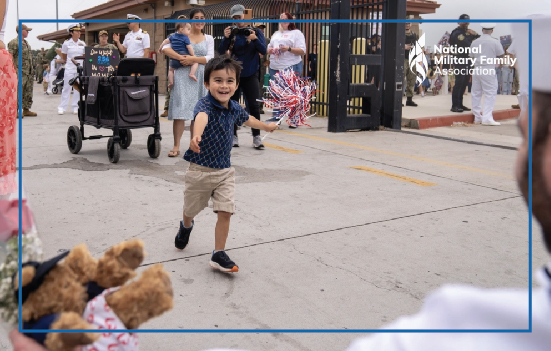Rebuilding Your Support System After a PCS: Why Community Matters More Than Ever

Every PCS comes with a familiar checklist: boxes to pack, paperwork to sign, and addresses to update, among other tasks. But for many military spouses, the hardest part of moving is the people you leave behind.
“You build friendships that almost feel like family, especially when your spouse is away for training or deployments,” says Mackenzie, an Air Force spouse. “When you move, you have to leave that behind in the hopes of, ‘I’ll see you later if timing ever works out.’ It really does feel like leaving family.”
That experience is shared by countless other military families. Each move requires more than learning new streets and setting up new routines. It also means beginning again with your support system, the very thing that makes military life not only sustainable, but also rich with connection.
The First Weeks: Lonely but Full of Possibility
The weeks right after a move often feel like the most difficult stretch. For Mackenzie, the challenge of her most recent relocation was the quiet that followed getting to their new duty station.
“Those first few weeks in a brand-new place can feel alienating,” she explains. “While your spouse has an instant network at work, you’re left trying to figure out where you fit. Making friends as an adult is hard, and even harder when you know one of you will likely move again in a few years.”
This sense of limbo is familiar to many spouses. Yet even in the middle of uncertainty, there is hope. With every move comes the opportunity to discover new friendships and fresh communities that provide the strength to carry us through our most trying times. That is why community is not only a comfort in military life, but the foundation that makes it possible to thrive.
Why Community Matters More Than Ever
Military families face certain pressures that make having a community essential. Frequent moves seem to uproot friendships just as they begin to strengthen. Families feel the squeeze as cost-of-living and childcare expenses climb higher. More spouses are managing careers or working remotely, which can reduce natural chances to connect. On top of that, military deployments and other lengthy separations can add even more strain on a military family.
In this type of environment, being part of a community is more than merely socializing. It’s the neighbor who offers to grab groceries when your service member is away, the fellow parent who understands what another PCS might mean for your military kiddos, and that future friend who becomes your emergency contact before you even know their last name.
“Sometimes it’s as simple as spotting another family at school orientation and thinking, ‘You look like a military family, we could be friends,” Mackenzie recalls. “It’s awkward, but you almost have to make the first move if you want to find belonging again.”
That first hello, though small, can be the spark that can make your new town go from unfamiliar to welcoming in one simple word.
Facing the Barriers with Hope
Rebuilding your community is never effortless. Many spouses hesitate to reach out because they fear rejection, feel weary from starting over, or simply don’t have the time while they balance careers, caregiving, and household responsibilities. Recognizing these challenges matters because it honors the reality of the work involved.
Acknowledging the barriers also shines a light on the courage it takes to move through them. Each PCS may feel like an ending, but it is also a doorway to something new. When we choose to push past fear and fatigue, we often find friendships waiting, strength we didn’t know we had, and a deeper sense of belonging that reminds us why being part of a community is worth the effort.
Five Practical Steps for Building Belonging
So how do you begin? While every PCS move looks different, there are a few simple and realistic ways to take those first steps toward rebuilding a local community.
- Start Small, Right Where You Are. Connection often begins in everyday routines. A smile at the playground, a wave to a neighbor, or a quick chat at school drop-off can open the door to friendship.
- Plug Into Local and Online Groups. Even if you cannot attend every event, joining a spouse network, Facebook group, or community page helps you learn about opportunities and connect with others in similar situations.
- Say “Yes” to One Thing. You do not need to do everything at once. Choose one manageable activity such as grabbing coffee, attending orientation, or volunteering for a short event. A single yes can lead to lasting relationships.
- Create Community Through Shared Spaces. Parents can often connect through schools and extracurriculars. Those without children can find a sense of belonging through gyms, faith groups, volunteer work, or hobbies. Shared spaces are natural gathering points for connection.
- Give Yourself Grace. Building community takes time. Celebrate small wins, like exchanging phone numbers or joining a group chat. Each step is progress and deserves recognition.
Taken together, these small actions may not feel significant in the moment, but they can grow into something powerful. They create the foundation for a network of support that makes military life not only manageable but also rewarding.
Building a Future Together
Community is what transforms challenges into opportunities and helps military families move beyond simply getting through. It is what allows us to truly thrive.
“Finding meaningful community is everything,” Mackenzie emphasizes. “You need people you can rely on. My advice is to just get out there, even if it feels silly. That’s how you build your new family.”
In the end, it’s not just about settling into a house. It’s about finding your people, the ones who make that house and new neighborhood feel like home. When we reach out, show up, and build connections, we discover that no matter where the journey takes us, we are never truly alone.
Share Your PCS Story
Every PCS comes with its own set of challenges and triumphs and also has the power to inspire others. If you’ve rebuilt your support system in a new place, we’d love to hear about your experience. Your story can offer encouragement and hope to military families who are navigating the same journey as yours.
By: Olivia Brinsfield, Content Manager




